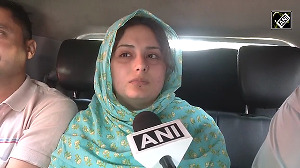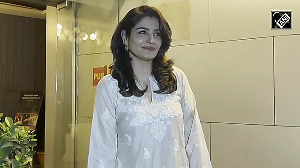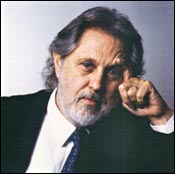 In the first part of our exclusive conversation, Lord David Puttnam spoke about his association with cinema, and how he came to be an Oscar-winning producer.
In the first part of our exclusive conversation, Lord David Puttnam spoke about his association with cinema, and how he came to be an Oscar-winning producer.
Here, in the conclusion to a tete-a-tete with Entertainment Correspondent Raja Sen, the man behind Chariots Of Fire and The Killing Fields reveals how he felt when he won the Academy Award, and what he sees happening in films nowadays.
The film that changed it all came about in 1981. Where did you find the inner resources to tackle a project of that magnitude, following a shaking of your own faith?
Ironically, I made Chariots Of Fire just to say 'this is who I am.' The film was a very personal expression of what I needed to see in the film, and I was extremely prepared for the film to be totally hated. I threw in everything into Chariots that I really believed in, and didn't compromise. And I was sure it wouldn't be accepted.
Everything about it seemed unlikely to succeed: it was a film set in 1924, about sport, and it was very English! What were the odds?
| |||||||||||
I was vindicated by its success, but my overall reaction was a combination of great relief and pure amazement.
Would you therefore call Chariots Of Fire your most personal effort as a filmmaker?
Not really. It was vital for me, and my career, but Local Hero was a film I was personally the most involved with, in every single aspect. Actually, those films came in relatively quick succession -- Chariots, Local Hero, Cal, The Killing Fields, The Mission.
All of it just happened so rapidly, and before I knew it, in a seven-year period, we were nominated for four Oscars.
Were you surprised by the Oscar attention? Were there any of your films you didn't think got the victories they rightfully deserved?
Let's look at the films chronologically.
Midnight Express, we always felt, had a great chance of getting a nomination -- it was a well-appreciated film, and very successful indeed. But it never really had a chance to actually win.
The Deerhunter won, that year (1979).
Chariots Of Fire I never expected to do as well as it did (1982), and never thought it might stand a chance at winning! I'm still slightly bemused by it.
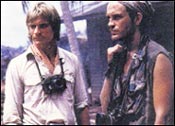 But then, in 1985, The Killing Fields (right) lost, and that was a film that really deserved to win.
But then, in 1985, The Killing Fields (right) lost, and that was a film that really deserved to win.
With that loss, I thought it evened out the fact that I won for Chariots. The unexpected victory was somewhat legitimised by this loss.
Amadeus won that year, and it was a good film, but The Killing Fields was a better film! I'm confident it had more resonance on cinema.
What about the Oscars today? What do you feel about the awards?
Well, they elicit mixed emotions.
Does Clint Eastwood deserve to be honoured for all his contributions to the world of cinema? Most definitely. Does he deserve it twice? I'm not so sure.
Personally, I was a little disappointed with Unforgiven; I didn't think it was that great.
Ray was a wonderful film, and Jamie Foxx was great in it. I also loved Sideways and Being Julia. I thought Laura Linney deserved to win for her great work in Kinsey -- that film got very unfairly ignored at this year's awards.
The Aviator was a great Scorsese spectacle, and among the best visual films last year.
With all your experience, do you feel the Oscars aren't as big or as important as they used to be?
Well, the early 1980s held the Oscars as enormously important. But then, that was an era when you could hold a film in one cinema theatre for six weeks, and slowly build up a good reputation for it through critics and word of mouth. Then, after the film established itself, you could expand its release.
Today, we're looking at a world where a film is released on Friday, and you're either dead or happy by Sunday. That's that.
Therefore, from the commercial point of view, they're certainly less important. But that would be just looking at ticket sales.
As soon as you factor in the DVD market, you see that Oscar-winning films do much better. Especially at the international marketplace. So I'd like to believe both factors even each other out.
What about critical importance? The media often criticises the awards for being overtly politically correct, looking at box-office performances, playing it safe and avoiding controversial films.
Do you think the Oscars are still as big a deal?
To sum things up, when I won in 1984, it was a big deal. Ten years later, in 1994, it was an even bigger deal. Ten years after that, in 2004, I'd say the gloss had gone down a little.
I daresay the Oscars may have peaked, and that's because they're falling prey to their own hype.
(Smiles) Having said that, lets just say I'm an optimist. There are lots of positives to be taken from the Oscars now.
Twenty years ago, independent films just began to be honoured at the Oscars. Now, Million Dollar Baby has to rank among them, as, in almost every way, it really is Clint's own film. There is certainly plurality in film.
What's really important is that studios keep supporting the Oscars, and Oscar-winning films. A lot of the blockbusters don't care about the Oscars, and the studios seem increasingly close to deciding that they don't matter anymore. They're close to losing interest, and that's lethal.
The studios need to accept that the kind of films that make the most money nowadays might not be the best films, and they still need to make Oscar movies anyway. They need to make films like Kinsey and Sideways.
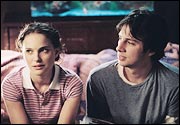 What kind of a trend do you see in present cinema? Do you like new films?
What kind of a trend do you see in present cinema? Do you like new films?
I think last year has been one of the best years from the recent few, in terms of good films. I loved a wonderful little film called Garden State (left), and it made me and my wife feel old in a great way -- it was an unusual perspective, and I really liked where it was coming from.
Sean Penn was fantastic in The Assassination Of Richard Nixon; Maria Full Of Grace and The Motorcycle Diaries were fabulous films.
The trend is interesting to consider.
I get an incredibly strong sense that the American empire is coming to an end.
All the best films are these insecure films, asking a lot of questions.
I feel the United States is going through a very severe crisis of self-confidence.
When Bush won last year, I feel it signals the end of something, it's an 'End of' to something vital. And his win was a direct result of the country's insecurity, buying into his reassuring façade.
So Hollywood is increasingly turning introspective.
There's an anxious edge to cult America, and these edgy films are a grave indicator of the societal fears plaguing their society today. They're questioning themselves constantly, relentlessly.
There are the bravado films too, obviously, but a large number of films are steeped in self-doubt.
Self-doubt is good for a country. It's a progressive step, that of chaos. It can be interesting, like a renaissance, but also very dangerous. It certainly can result in an explosion of frustration.
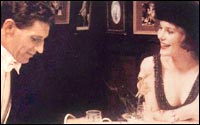 'Bravado' films are something you've always loathed. I remember you saying you wouldn't produce Rambo if the $150 million profit cheque was given to you before the film. Why this dislike for the film? It does work as an entertainer, doesn't it?
'Bravado' films are something you've always loathed. I remember you saying you wouldn't produce Rambo if the $150 million profit cheque was given to you before the film. Why this dislike for the film? It does work as an entertainer, doesn't it?
Is it entertaining? Or are we looking at yet another reassuring façade?
Films have to be about people, about real people! Certainty is boring. True courage is when a character conquers his own self-doubt.
What I've tried to do when I've shown strong characters is that I've shown their survival -- in both The Killing Fields and Chariots Of Fire (right, above) -- and how they've succeeded despite themselves. Humans face crises, and emerge out of them in their own unique way -- now that is interesting. Not crazily brave men!
What about the Columbia pictures experience? You were there for just over a year, and came back with bitter, angry memories. Do you regret it?
It was a bad move to begin with. It didn't work out, and, as I've been saying, I'm just not the right person to work in a 'job.'
The Columbia experience was something I was really angry about at the time, but I was an entirely miscast person in that role. The primary mistake was that sellers should never become buyers. (Laughs) Their basic reaction to me was simply, 'Why doesn't he **** off and become a professor?', which I now find deliciously ironic.
Do you see yourself ever returning to cinema now?
I'm too old and have learnt not to say 'never', but, quite frankly, no. Even if I want to do something on my own, perhaps I'll dabble in a documentary series or something, but not fictional films. I think I've done enough. I really don't have the self-assurance to continue in that vein.
Alan Parker asked me recently, as he frequently does, if we'd like to collaborate on a project together, like old times, but I honestly don't think I can bring enough to the table. Using the vulgar advertising phrase, I just don't think I can 'add value' to a film project anymore.
So are you happy with life now?
Well, there's working for the University of Sunderland, which is a great challenge, and then there's the mammoth task of UNICEF. I love my life!
At Columbia, I was at war with myself. Now, I really find a perfect harmony. And I'm more energised than ever!
At this point, while we were wrapping up, Lord Puttnam's wife, the lovely Patricia Mary Jones, walked in and dazzled us with a smile. The peer beamed at her and asked, "Pat, you tell this young man. Am I more content with life now?" She looked at me and winked -- "Well, he's older! That's how they feel as the years pass!"
Don't miss! Part One: A legend talks cinema





